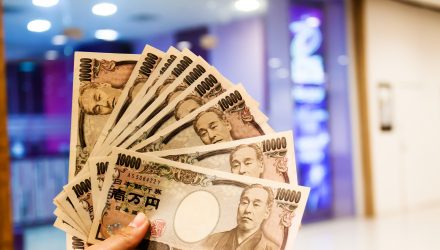As the Japanese yen begins to depreciate against the U.S. dollar, investors who want to tap into the export-oriented economy may consider currency-hedged ETFs to diminish the negative effects of foreign exchange currency risks.
The U.S. dollar now trades at ¥109.7, compared to a low of ¥104 back in March.
“It’s worth keeping an eye on this $/Y momentum, as we have seen Fx-hedged Japan products become very active in the past under these conditions,” according to a Virtu note.
Currency Hedged ETF Options
The depreciating JPY has allowed currency-hedged Japan ETFs to outperform their non-hedged peers. For instance, the WisdomTree Japan Hedged Equity Fund (NYSEArca: DXJ), iShares Currency Hedged MSCI Japan ETF (NYSEArca: HEWJ) and Deutsche X-trackers MSCI Japan Hedged Equity ETF (NYSEArca: DBJP) have been go-to options to access Japanese equities markets while hedging against foreign exchange risks. As the dollar strengthened against the yen currency over the past three months, DXJ gained 2.1%, HEWJ rose 4.3% and DBJP increased 4.3% while the non-hedged benchmark MSCI Japan Index was 0.1% higher.
The Bank of Japan still has a lot of leeway in allowing the Japanese yen depreciate against the U.S. dollar.
“The BOJ would want to stop that before the yen gets too weak,” Masahiro Kawai, a longtime associate of BOJ Governor Haruhiko Kuroda, told Bloomberg, adding that such a move wouldn’t indicate a policy exit. “The limit is maybe 125 per dollar – 130 is obviously excessive.”
A weak yen has been an unspoken policy objective as it would help stoke inflation, but too much weakness can also weigh on business that import raw materials and consumers would also see higher prices on imports. Consequently, some traders call the zone around 125 yen to the dollar the “Kuroda line.”
For more information on currency-hedged strategies, visit our currency hedged ETFs category.
